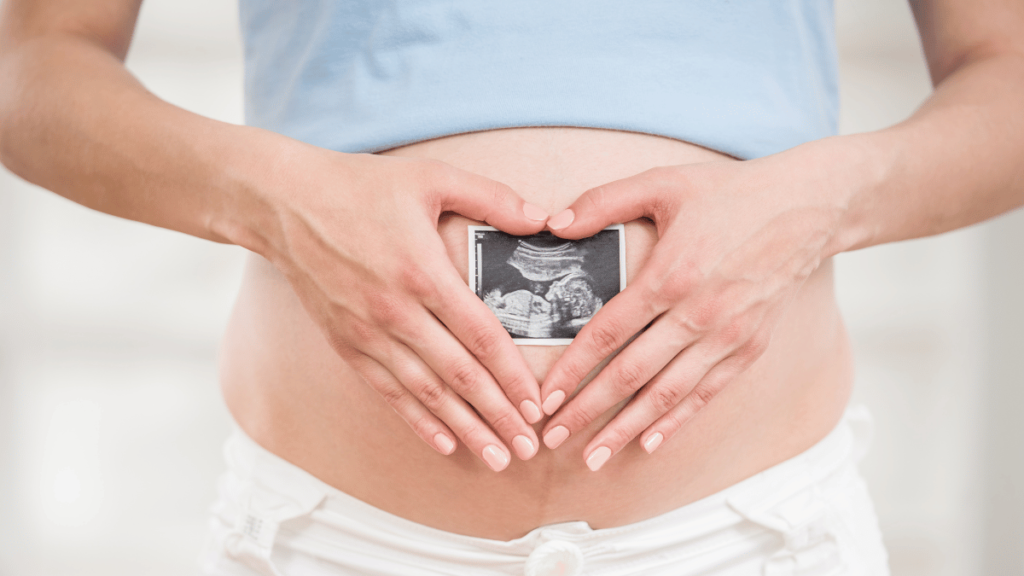
As you reach eight weeks pregnant, you may have already experienced a number of the early signs and symptoms of pregnancy. However, as you approach your second month, some of these may intensify and you might start to notice a few more visible changes to your body. It’s also time to start planning your doctor or midwife appointments and thinking about booking in your first scan.
By eight weeks, your baby is growing at a rate of one millimeter a day – which makes it harder to give an accurate idea of size. At this stage, the fetus is the about the size of a raspberry or an olive.
As the limbs continue to lengthen and grow, the fetus’ shape is changing and starting to look like less of an alien. The upper lip and nose are starting to form and, although the hands and feet are still webbed, fingers and toes are beginning to develop.
At this stage, your baby is still getting its nutrients from you in the yolk sac, while the placenta continues to develop. Baby’s heart is beating fast, too. At around 150 to 170 beats per minute, it’s almost twice as fast as your own.
Eight weeks in and you might already be pretty clued up on all the early pregnancy symptoms. Or, for some women, you may not have experienced any signs or symptoms so far in your pregnancy journey. Everyone woman is different, but here’s a recap of some of the common symptoms at this stage.
Morning sickness is one of the most common pregnancy symptoms, although not everyone will suffer from it in their first trimester. Unfortunately for some women, the eight-week mark can be when nausea and vomiting are most intense.
Breast tenderness is another common symptom at this stage as the pregnancy hormone levels in your body continue to change.
As your uterus continues to expand, it can press on your bladder and result in what feels like endless trips to the toilet. The increased blood flow to your kidneys means you’ll produce more up to 25% more urine, too.
You may notice that you become much more sensitive to certain smells during the first trimester of your pregnancy. This, along with nausea, is a pretty hellish combination for some women during the first couple of months of pregnancy. Thankfully, symptoms tend to wear off as you progress through your second trimester.
From around 5 weeks some early pregnancy cravings might start to kick in and you could find yourself hankering for gherkin sarnies and lemon slices.
One benefit of your increasing hCG levels and hormone changes is great hair!
With fluctuating hormones, changes to your body and not to mention the fact you’re growing a whole new human in your belly, it’s no wonder you might feel exhausted during the first three months. At eight weeks, your body is also producing more blood for your baby. This causes your blood pressure and blood sugar levels to dip, leaving you feeling more tired than usual.
Spotting at eight weeks can be alarming, but for some women light bleeding in the early months is common and nothing to worry about. However, bleeding can also signal a miscarriage. If you have been experiencing cramps, and the bleeding is more than light spotting, you should contact your doctor, midwife or visit your nearest hospital.
Just as pregnancy symptoms can vary from mom to mom, every woman is different when it comes to a baby bump. Some women may start showing at eight weeks. By now, your uterus is expanding, and your stomach muscles are relaxing in order to create space for the baby to go. You might be more likely to have a baby bump if you are eight weeks pregnant with twins.
You may have already booked your first prenatal appointment, often called the ‘booking appointment’, or have it in the next couple of weeks. This usually takes place between 8 and 10 weeks in order to have the tests needed before the 10-week stage. You may not have an ultrasound at your first appointment, but some doctors may offer one and it could be the first time you’ll hear baby’s heartbeat. This usually happens at the 12 or 16-week scans as heartbeats are easier to locate in the second trimester.
As we mentioned early, it’s likely you will have your first appointment at around 8 to 10 weeks pregnant. The appointment usually lasts about one hour and will see the midwife or doctor take a number of screening tests.
They will measure your height and weight to work out your BMI, test your blood pressure and check your urine. They’ll also take a blood test to check for any diseases that could harm your baby. They’ll then ask a number of questions to determine whether you will also need a blood test to check for sickle cell and any other blood disorders. They’ll also ask about any previous pregnancies, deliveries and take an overall history of your health.
This first appointment is a good opportunity to ask your midwife or doctor any questions you might have about your pregnancy and your baby’s development. You should also be given information about the next steps in your pregnancy. This includes foods to avoid during pregnancy, prenatal classes, breastfeeding and the various tests and scans you’ll be offered.
Head back to find out what’s happening at 9 weeks pregnant.

© 2023 All rights reserved Baby & Toddler - part of parent promotions